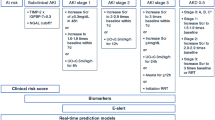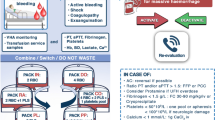Abstract
Aim
To study plasma B-type natriuretic peptide BNP) variation in adult multi-trauma patients and to correlate BNP levels with the class of haemorrhagic shock and the amount of fluids received during resuscitation.
Method
Multi-trauma patients (class II–III haemorrhagic shock) without brain injury were included and their plasma BNP level was measured at 24 and 72 hours.
Results
Twenty-one adult patients with no previous heart disease were included in the study. BNP levels >500 pg/ml were not observed, 9 were < 5.0 pg/ml (undetectable), 24 within normal limits (5.0–100 pg/ ml) and 7 slightly above normal (>100 pg/ml). BNP levels were within normal range in most patients at 24 (81%) and 72 hours (86%).
Conclusions
Multi-trauma patients with no brain injury are able to handle the amount of volume infused at resuscitation without statistically significant elevation of BNP levels. We found no difference between BNP levels in class II and class III shock in adult multi-trauma patients.
Similar content being viewed by others
References
Beekley AC. Damage control resuscitation: a sensible approach to the exsanguinating surgical patient. Crit Care Med. 2008 Jul;36(7 Suppl): S267–S274.
Sihler KC, Napolitano LM. Complications of massive transfusion. Chest 2010 Jan; 137(1):209–220.
Zakaria el R, Tsakadze NL, Garrison RN: Hypertonic saline resuscitation improves intestinal microcirculation in a rat model of hemorrhagic shock. Surgery, 2006 Oct;140(4):579–588.
De Bold A (1985). “Atrial natriuretic factor: a hormone produced by the heart” Science 230(4727):767–770.
Atisha D, Bhalla MA, Morrison LK et al: A prospective study in search of an optimal B-natriuretic peptide level to screen patients for cardiac dysfunction. Am Heart J 2004 Sep;148(3):518–523.
Kirchhoff C, Stegmaier J, Bogner V et al: Intrathecal and systemic concentration of NT-pro BNP in patients with severe traumatic brain injury. J Neurotrauma. 2006 Jun;23(6):943–949.
A.T.L.S. American College of Surgeons — Committee on Trauma 6th edition — 3rd chapter «shock».
Bickell WH, Wall MJ, Pepe PE et al: Immediate versus delayed fluid resuscitation for hypotensive patients with penetrating torso injuries. N Eng J Med 1994; 331:1105–1109.
Battlefield Advanced Trauma Life Support (3ed.). Joint Services Publication 570, 2006.
Holcomb JB, Wade CE, Michalek JE et al: Increased plasma and platelet to red blood cell ratios improves outcome in 466 massively transfused civilian trauma patients. Ann Surg. 2008 Sep;248(3):447–458.
Baker AJ, Rhind SG, Morrison LJ et al: Resuscitation with hypertonic saline -dextran reduces serum biomarker levels and correlates with outcome in severe traumatic brain injury patients. J Neurotrauma 2009 Aug; 26(8): 1227–1240.
Crookes BA, Cohn SM, Bonet H et al: Building a better fluid for emergency resuscitation of traumatic brain injury. J Trauma 2004 Sep;57(3):547–554.
Galinska A, Hatch V, Craig R et al: The C terminus of cardiac troponin I stabilizes the Ca2+- activated state of tropomyosin on actin filaments. Circ Res. 2010 Mar 5;106(4):705–711.
Levin ER, Gardner DG, Samson WK. Natriuretic peptides. N Engl J Med 1998; 339:321–328.
De Bold AJ, Bruneau BG, Kuroski de Bold ML: Mechanical and neuroendocrine regulation of the endocrine heart. Cardiovasc Res 1996 Jan;31(1):7–18.
Sviri GE, Soustiel JF, Zaaroor M: Alteration in brain natriuretic peptide (BNP) plasma concentration following severe traumatic brain injury. Acta Neurichir (Wien) 2006;148(5):529–533.
Brenden CK, Hollander JE, Guss D et al: Gray zone BNP levels in heart failure patients in the emergency department: results from the Rapid Emergency Department Heart Failure Outpatient Trial multicenter study. Am Heart J. 2006 May; 151(5):1006–1011.
Tsuchida K, Tanabe K: Influence of paroxysmal atrial fibrillation on brain natriuretic peptide secretion. J Cardiol. 2004 Jul;44(1):1–11.
Tsutamoto T, Wada A, Sakai H et al: Relationship between renal function and plasma brain natriuretic peptide in patients with heart failure. J Am Coll Cardiol. 2006 Feb 7;47(3):582–586.
Wang TJ, Larson MG, Levy D et al: Impact of obesity on plasma natriuretic peptide levels. Circulation. 2004 Feb 10;109(75):594–600.
Kia M, Cooley A, Rimmer G et al: The efficacy of B-type natriuretic study for early identification of blood loss in traumatic injury. Am J surg 2006 Mar;19(3):353–357.
Kirchhoff C, Leidel BA, Kirchhoff S et al: Analysis of Nterminal pro-B-type natriuretic peptide and cardiac index in multiple injured patients: a prospective cohort study. Crit Care 2008;12(5): R 118.
Stewart D, Waxman K, Brown CA et al: B-type natriuretic peptide levels may be elevated in the critically injured trauma patient without congestive heart failure. J trauma 2007 Oct;63(4):747–750.
Friese RS, Dineen S, Jennings A et al: Serum B- type natriuretic peptide: a marker of fluid resuscitation after injury? J Trauma 2007 Jun;62(6):1346–1350.
Author information
Authors and Affiliations
Corresponding author
Rights and permissions
About this article
Cite this article
Bouras, P., Rogdakis, A., El-Fellach, N. et al. Plasma B-type natriuretic peptide (BNP) variation in multi-trauma patients. Hellenic J Surg 83, 202–209 (2011). https://doi.org/10.1007/s13126-011-0039-9
Received:
Accepted:
Published:
Issue Date:
DOI: https://doi.org/10.1007/s13126-011-0039-9




